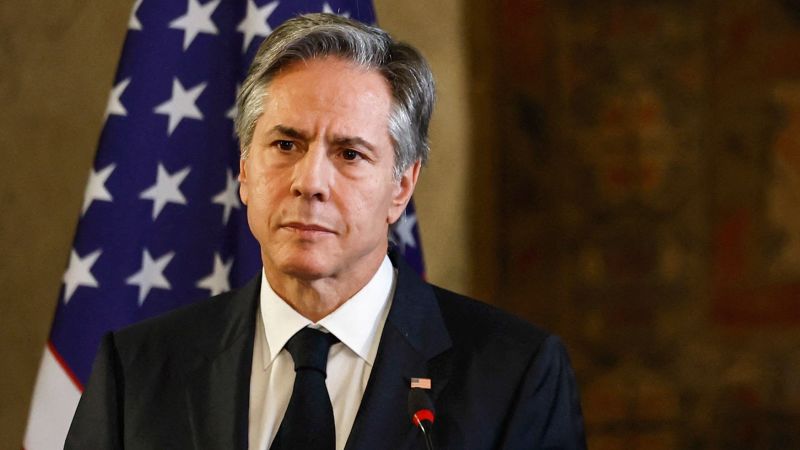Blinken under pressure to push China on role in lethal fentanyl trade when he visits Beijing | CNN Politics
CNN
—
Members of Congress are urging Secretary of State Antony Blinken to pressure China to do more to curb the flow of fentanyl and synthetic opioids into the United States on his visit to the country which is expected to take place in the next few days.
On Wednesday, a group of 14 Republican senators led by Marco Rubio of Florida wrote to Blinken ahead of his trip highlighting China’s role in the “fentanyl crisis” as one of many issues they wanted him to address.
More than 100,000 Americans died of drug overdoses from July of 2021 to July of 2022 and two thirds of those deaths were fueled by synthetic opioids, primarily fentanyl, according to the CDC.
An extremely powerful synthetic drug, fentanyl is 50 to 100 times more potent than morphine and 30 to 50 times more potent than heroin.
The Chinese government cracked down on the manufacture and distribution of fentanyl in 2019, in a move that was hailed by the Trump administration. As a result, China it is no longer the primary source of fentanyl getting into the US. But it’s still the key source of precursor chemicals which are often shipped to Mexico and used by cartels to produce fentanyl which is brought over the border.
“China is the leading producer of these precursor chemicals and is shipping and selling them to the two major Mexican cartels (Sinaloa and New Generation) producing fentanyl,” explained David Luckey, a senior international and defense researcher at RAND Corporation.
“Virtually 98% of the precursor chemicals that are made used to make fentanyl are coming from China,” Democratic Rep. David Trone of Maryland told CNN. Getting China to engage on this crisis “has got to be Secretary Blinken’s number one mission when he gets there.”
Experts and lawmakers say the production of precursor chemicals in China is a primary factor fueling the ongoing opioid crisis.
“Synthetic opioid trafficking is an area where even a few meaningful steps from the PRC (People’s Republic of China) can play a significant role in combating this worsening epidemic and saving American lives,” Trone wrote in a letter to Blinken last month. He urged Blinken not to negotiate with Chinese officials on other topics until he has secured a commitment from Beijing to do more to stem the fentanyl crisis.
Trone, whose nephew died of a fentanyl overdose, believes China should commit to adopting rules requiring drug companies to know who their customers are, put into place and enforce export regulations on the chemical sector, and cooperate with US agencies including the Drug Enforcement Administration and Office of National Drug Control Policy to crack down on the fentanyl trade.
Blinken has directed his team at the State Department to work with interagency partners to do “everything possible” to address this deadly crisis which is the leading killer of Americans between the ages of 18 to 49, State Department spokesperson Ned Price said earlier this year.
But it’s unclear what direct asks he will make of the Chinese government during his visit.
“Though its past action has helped to counter illicit synthetic drugs, we continue to urge the PRC to take additional meaningful concrete action to curb the diversion of precursor chemicals and equipment used by criminals to manufacture fentanyl and other synthetic drugs,” Price said.
Some lawmakers believe that Blinken should offer trade talks with China if it engages on efforts related to stemming the fentanyl crisis. Yet other congressional aides say that China will only respond to pressure and believe that the administration should consider steps including additional sanctions related to the dangerous substances – to force their engagement.
Todd Robinson, the top State Department official for international narcotics and law enforcement affairs, said that the effective way to approach the challenge will be through “collaboration and cooperation.”
“China has its own problems with narcotics. Mexico has problems has its problems with narcotics. Colombia also has a problem. And what we’ve been saying is, this is no longer an issue where you can solely use one or the other. Everybody’s got a problem.”
But the need for Chinese engagement is clear: reducing the supply of precursor chemicals from China would have a “huge” impact on the crisis and would “mean a dramatic decrease” in US deaths resulting from drug overdoses, Robinson said.
China is the largest producer of chemicals that are in everyday products such as cleaning supplies. Many Chinese companies have begun producing and selling the precursor chemicals in addition to the chemicals they have already been producing.
Challenges to tackling the root of the problem persist when China and other countries often turn the tables on the US and blame Americans for the addiction problem which drives the demand.
“It’s not as simple as saying, ‘China, stop producing and exporting these chemicals’. There are several sides to this issue. In response, China, for example, could counter with, ‘Americans, stop buying and using drugs,’” said Luckey.
Many Americans with a direct connection to the crisis are watching Blinken’s trip closely.
West Virginia – which had more than 1,300 deaths due to synthetic opioids from March of 2021 to March of 2022, according to the CDC – is an epicenter of the domestic crisis.
Jordan Dennison lives in the state, grew up with parents who were drug addicts, and developed his own opioid addiction in his teens. A few years ago – after more than 10 overdoses – he finally got clean. The 30-year-old now works at an outreach program to get addicts into treatment.
“Drugs led me to lose everything. Every relationship I ever had. I came to learn that what I was using was not heroine it was fentanyl. I was getting it off the street, I would go anywhere to get it,” he told CNN. “I never knew where it came from, but I always assumed it was coming from China.”




